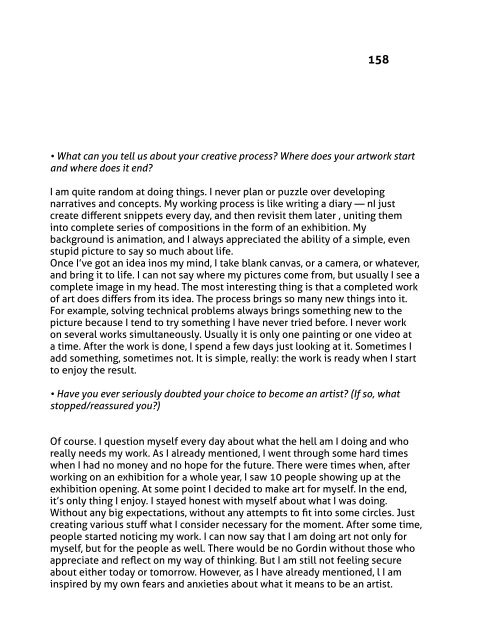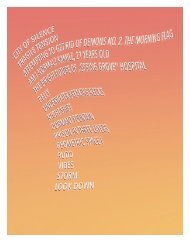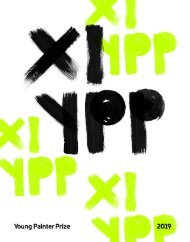X YPP Book
The main aim of the project - to discover new talent in Baltic States.
The main aim of the project - to discover new talent in Baltic States.
Create successful ePaper yourself
Turn your PDF publications into a flip-book with our unique Google optimized e-Paper software.
158<br />
• What can you tell us about your creative process? Where does your artwork start<br />
and where does it end?<br />
I am quite random at doing things. I never plan or puzzle over developing<br />
narratives and concepts. My working process is like writing a diary — nI just<br />
create different snippets every day, and then revisit them later , uniting them<br />
into complete series of compositions in the form of an exhibition. My<br />
background is animation, and I always appreciated the ability of a simple, even<br />
stupid picture to say so much about life.<br />
Once I’ve got an idea inos my mind, I take blank canvas, or a camera, or whatever,<br />
and bring it to life. I can not say where my pictures come from, but usually I see a<br />
complete image in my head. The most interesting thing is that a completed work<br />
of art does differs from its idea. The process brings so many new things into it.<br />
For example, solving technical problems always brings something new to the<br />
picture because I tend to try something I have never tried before. I never work<br />
on several works simultaneously. Usually it is only one painting or one video at<br />
a time. After the work is done, I spend a few days just looking at it. Sometimes I<br />
add something, sometimes not. It is simple, really: the work is ready when I start<br />
to enjoy the result.<br />
• Have you ever seriously doubted your choice to become an artist? (If so, what<br />
stopped/reassured you?)<br />
Of course. I question myself every day about what the hell am I doing and who<br />
really needs my work. As I already mentioned, I went through some hard times<br />
when I had no money and no hope for the future. There were times when, after<br />
working on an exhibition for a whole year, I saw 10 people showing up at the<br />
exhibition opening. At some point I decided to make art for myself. In the end,<br />
it’s only thing I enjoy. I stayed honest with myself about what I was doing.<br />
Without any big expectations, without any attempts to fit into some circles. Just<br />
creating various stuff what I consider necessary for the moment. After some time,<br />
people started noticing my work. I can now say that I am doing art not only for<br />
myself, but for the people as well. There would be no Gordin without those who<br />
appreciate and reflect on my way of thinking. But I am still not feeling secure<br />
about either today or tomorrow. However, as I have already mentioned, l I am<br />
inspired by my own fears and anxieties about what it means to be an artist.<br />
• Do you find the Baltic art scene interesting? (What is your opinion about<br />
Lithuanian, Latvian and Estonian art? How would you describe their differences?)<br />
I am not well versed in art theory. I usually just enjoy looking at an artwork<br />
without digging into the geopolitical or cultural contexts. I am interested in all<br />
kinds of art fields, whether they are Baltic, Scandinavian or South African. The<br />
Estonian art scene and a country as a whole become more and more focused on<br />
technology. Estonia now advertises itself as an ‘e-country.’ No doubt this reflects<br />
on art as well. There are not many painters among the young generation of<br />
artists. Our scene is becoming extremely oriented toward the new media. I am<br />
sure that Lithuanian and Latvian art scenes are a bit more traditional. Art schools<br />
are paying more attention to the basics of the craft and there are more promising<br />
young painters. During the past few years, Estonia have expanded its contacts<br />
with Scandinavian and West European art scenes, while Latvian and Lithuanian<br />
scenes are still quite localised.<br />
• How did the Young Painter Award influence your artist’s career?<br />
After winning the the <strong>YPP</strong> competition I received a huge amount of attention.<br />
I was bombarded with articles, interviews, and congratulations from numerous<br />
colleagues. The Award helps you to believe in yourself, and realise that your<br />
work can be appreciated on a global scale. But then you forget about it quickly,<br />
just like most other people do. It is hard to see how the <strong>YPP</strong> affected my career<br />
in a long run because it has been less than a year since I received the Award. The<br />
first part of the year 2018 was crazy, I could not even handle the amount of<br />
invitations to participate in various exhibitions. Surely the fact of being a <strong>YPP</strong><br />
awardee played a big role, because my name became quite visible everywhere.<br />
Now that this PR tsunami is calming down, I still have to make plans for the next<br />
year, after the <strong>YPP</strong> exhibition in Pamenkalnio Gallery (Vilnius). Generally, my<br />
personal experience shows that any presentation of your work is good. It does<br />
not matter whether you won something or not. You never know who will see it<br />
and where it will lead you. Winning a big competition definitely feed your ego,<br />
and it should not happen too often. When it happened to me, I took maximum<br />
from this experience and realised the power of public attention.





